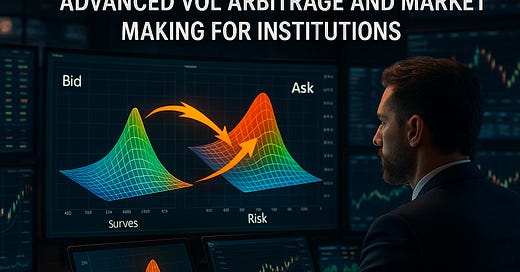Day 62 – Advanced Vol Arbitrage and Market Making for Institutions
How institutional desks extract edge from volatility mispricings, manage inventory, and keep crypto options markets efficient.
Professional options trading is dominated by institutions running systematic vol arbitrage and market making strategies.
These firms exploit inefficiencies in the vol surface, keep books risk neutral, and play a crucial role in keeping spreads tight for all users.
Today, we go inside the advanced practices that define institutional vol trading and market making on Derive.
1. Vol Arbitrage: Sources of Edge
Cross Exchange Arbitrage:
Exploit IV and price differences for the same asset (BTC, ETH) across Derive and other venues.
Buy underpriced options, sell overpriced ones, hedge delta with perps or spot.
Calendar and Skew Arbitrage:
Arbitrage differences between expiries (calendar), strikes (skew), or assets (dispersion).
Example: If weekly IV is higher than monthly, sell short dated, buy long dated.
Statistical and Vol Premium Arbitrage:
Systematically sell options when IV is far above realized, hedge with dynamic delta adjustment.
2. Inventory and Risk Management
Delta, Gamma, Vega Neutrality:
Target neutral exposure to direction, convexity, and volatility.
Use spreads, combos, and spot or perp hedges.
Dynamic Rebalancing:
Update hedges in real time as trades fill, IV moves, or markets gap.
Inventory Recycling:
Work off risk via block trades, RFQs, or managing through other expiries or strikes.
3. Market Making: Providing Liquidity and Earning Edge
Quote Automation:
Use bots and APIs to quote two sided markets across many strikes and expiries.
Update prices based on real time IV, inventory, and risk targets.
Spread Management:
Widen or tighten spreads based on volatility, competition, and internal risk.
Order Book and RFQ:
Use both public book and RFQ for large blocks, facilitating execution for institutional clients.
4. Tools and Analytics
Real Time Greeks and VaR:
Monitor total Delta, Gamma, Vega, and Value at Risk across all books.
Vol Surface Monitors:
Spot and arbitrage mispricings as the surface evolves intraday.
Custom Dashboards and Alerts:
Track fills, inventory, risk, and PnL with millisecond latency.
5. Execution on Derive
Connect via API for low latency quoting and trading.
Use analytics for real time risk and vol surface insight.
Access block liquidity and custom pricing through RFQ for size and complexity.
Your Action Today
Explore Derive’s API and analytics documentation for institutional features.
Simulate a cross exchange or calendar arbitrage trade and review the workflow.
Consider how systematic vol trading differs from manual or directional options approaches.
Tomorrow, we will look at building a professional options trading desk: technology, team, and risk controls.
Hasta manana
Cpt




